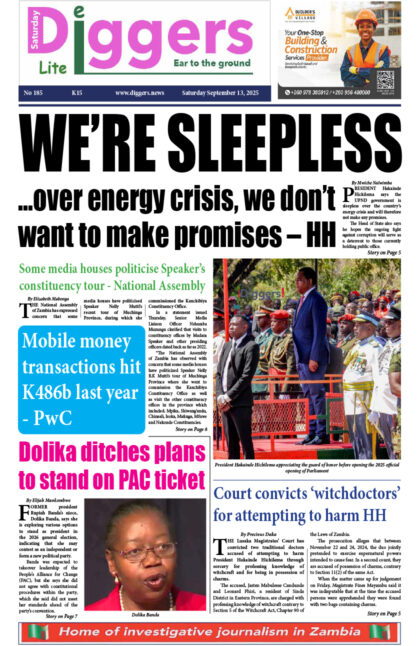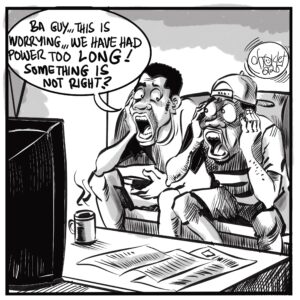The long march towards constitutional stability in Zambia continues. We are yet again at the precipice of possibly another failure at constitutional reforms. Bill No 10 was intended to be a process to address lacunae and refine some provisions of the 2016 Constitution Amendments, but this has now turned out to be a major operation, further dividing the Zambian populace. The desire of many Zambians over the years, going back to the 1991 Mvunga Constitution Review Commission right up to the recently held National Dialogue Forum, has been for a people-centred and people-driven constitution. The failure of successive constitution processes can partly be attributed to a lack of trust in the process and the politicization of the reform agenda. Trust is political capital and a vital component for any successful democracy.
A historical review of constitution reform in Zambia, clearly shows that constitutions and constitutional amendments have been drafted by a political coterie and usually driven by short term political exigencies such as success at the next election or appointment to a position such as Cabinet position. The motivation for constitution reforms in Zambia has rarely been about establishing a solid foundation for socio-economic development. It is for this reason that political players take centre-stage and assume that political questions should be attended to at the expense of all others. An explicit example of this is the National Dialogue Forum which in its mandate focussed on facilitating the implementation of resolutions that were made on 12th June, 2018, in Siavonga by Secretaries-General of political parties relating to Constitutional and institutional reforms.
Consensus building on both process and content has not been prioritized and the ruling party has found it expedient to politically engineer public participation, often leaving out stakeholders who are considered not to be supportive of the political agenda. In some instances, critical stakeholders including the church, civil society and opposition political parties, have shunned to be part of dialogue processes which they have considered to be designed to serve little purpose than to rubber stamp the political agenda of the ruling party. This strong desire by politicians to drive the constitution reform agenda is the genesis of the mistrust and diminished legitimacy of the constitution.
Mr. Patrick Matibini (as he was then known), in a paper presented to the Oasis Forum Constitutional Debates Conference held on 4 and 5 July 2002 at Mulungushi International Conference Centre, said the following-“ It is important to involve the citizens in any constitution making process. A public participation programme assures that constitution of legitimacy. What does the legitimacy of constitution at any rate mean? The question of legitimacy of the constitution is concerned with how to make a constitution command the loyalty, obedience and confidence of the people. The legitimacy of the constitution is crucial for constitutionalism and democratic consolidation. To this extent, it has been observed that a major cause of constitutional governments in many states is the general lack of respect for the constitution among politicians themselves.”
The decision of the Constitutional Court to dismiss the petition by the Law Association of Zambia and Chapter One Foundation regarding Bill No 10 has inevitably thrust the responsibility to craft a constitution which enjoys legitimacy, in the hands of Members of Parliament. The question is does Bill No 10 in its current form and given the discontent by many stakeholders, provide a solid base for this country to finally adopt a constitution or constitutional amendments which command the loyalty, obedience and confidence of the people? Dr Matibini, in the paper presentation referred to above, concluded that “constitutions which are introduced at fairly short intervals, tend to be short-lived. The result is chronic constitutional instability on the continent.”
On Tuesday 3 December 2019, the vote to restore Bill No 10 on the order paper was taken in Parliament. Ideally, all 17 million people should be involved in crafting the constitution but this is not realistic and therefore, we the people give this honourable task to people we elect to serve as our Representatives. Unfortunately, there are numerous instances when our representatives abdicate this role and opt to serve as agents of their political parties. This is what is fuelling genuine fears among the citizens that the People’s representatives will yet again seek to pay allegiance to their parties’ agenda rather than serve the public desire for national development and a consolidation of our democracy. In the debate on Bill 10, the people’s representatives should only be seized by one imperative- to serve in full consent of the people’s aspirations for a good constitutional order.
For MPs from the Patriotic Front, United Party for National Democracy and the Forum for Democracy and Development, these should be reminded that they come from parties which between 2002 and 2010, as opposition political parties, shared a common vision for a constitution that reflected most of the people’s aspirations. Records show the active engagement of these parties, particularly the PF in various activities called by the Oasis Forum, NGOs and the church, calling for urgent constitutional reforms.. In September 2001, the Oasis Forum convened a National Convention at Mulungushi International Conference Centre to debate and draw consensus on problems afflicting the people of Zambia and to come up with a governance reform agenda. The UPND and FDD were some of the parties that participated as well as trade unions, student bodies, professional associations and NGOs. The participants adopted a People’s Declaration. In a strange twist of fate, it the same PF and UPND that were actively involved in demanding for a robust constitutional reform programme from the MMD, in whose hands the future of the Zambian constitutional amendments lie. The call for a durable constitution which the PF, UPND and FDD believed in during the Mwanawasa administration, is still the same call that is being made today, when the PF is in the saddle of power.
To the Zambian people, the search for a durable people-centred constitution continues to be elusive, but we should not give up. What we are fighting for is a constitution that will serve as a catalyst for political, social, cultural and economic development. As a nation, we have already invested a lot in this endeavor but there is still a lot of work to do for us to have a broadly accepted constitution. We should however, learn one lesson, we cannot leave this exercise in the hands of politicians, most of them who are looking out for their own personal benefits. We the people should actively be involved. The words of the late President Levy Mwanawasa in a statement made on 4 May 2003, should continue to inspire us never to give up even when we are cheated by our representatives. President Mwanawasa in talking about the Mung’omba Constitution Review process which his government had initiated, said: “Yes, we have agreed to make yet another attempt, because we cannot surrender ourselves to past deceit and failure. We have a duty to our nation; to ourselves first and forever to posterity. We cannot give up on our nation and on our people, just because some President and his leadership cheated on us. We must accept that we were cheated and deceived, yes. But let us not give up on this account, rather learn lessons from it, and continue to try.”
(The author is Transparency International Zambia president)
























